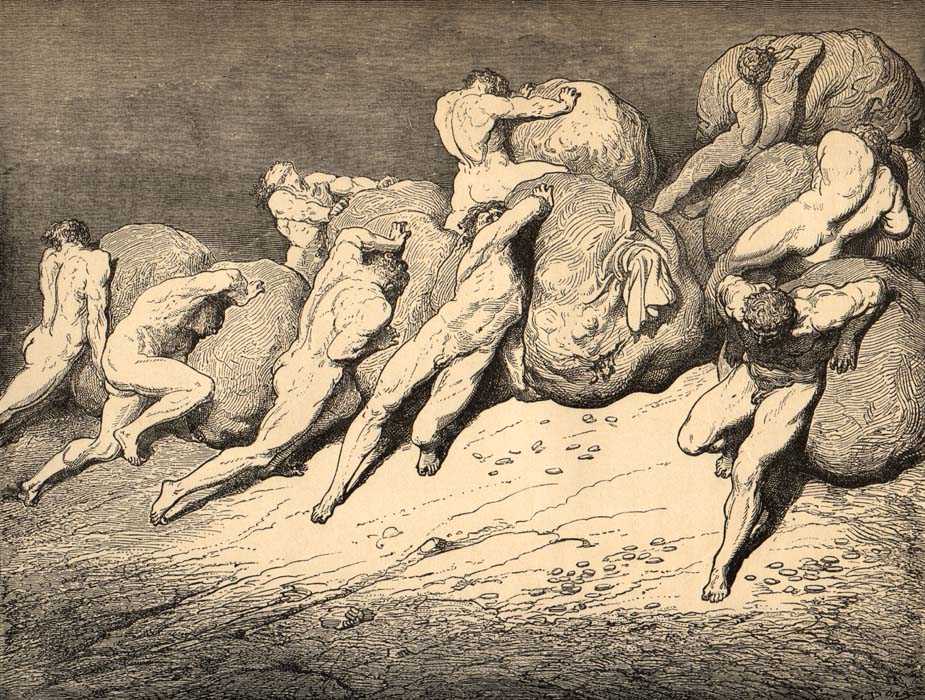There are many posts on these subjects. But, today, I want to highlight the worship of Mammon.
 |
| Thanks to Wiki for painting 1909 painting The Worship of Mammon by Evelyn De Morgan. |
Many years ago, I had a poem published in one of the Notre Dame poetry journals, which connected the worship of Mammon with abortion. That the poem was published astounded me. It is floating around somewhere, but I do not have a copy.
However, today, I do not want to connect the worship of Mammon, who is a false god of the ancient world, but still active in our society as either an ideal or as a demon, with abortion.
I want to connect this horrible worship, the idolatry of things, money, position and status with the capital sin of Greed.
The trouble is that the capital sins reward those who commit them. That is part of the fatal attraction of these sins. In Advent, instead of praying and meditating on the coming humble Birth of the Incarnate Son, people are obsessed with things, parties, more things, concerts, more things, and so on.
That the capital sin of greed could be connected to a demon is seen in the Scriptures. Here is a line from CE, which saved me some time in finding the references....
The Catholic Encyclopedia notes this: In the New Testament only Matthew 6:24, and Luke 16:9-13, the latter verse repeating Matthew 6:24. In Luke 16:9 and 11 Mammon is personified
This source also notes.
Thus Peter Lombard (II, dist. 6) says, "Riches are called by the name of a devil, namely Mammon, for Mammon is the name of a devil, by which name riches are called according to the Syrian tongue." Piers Plowman also regards Mammon as a deity.
That many Catholics voted for their wallets by following the socialist doctrines of a certain party, and did not vote pro-life, is an indication of demonic influences.
 |
| The Avaricious in Dante |
That many Catholics are not praying, or going to confession or spending time in mediation during Advent, but running around buying things, is an indication of excess.
Any excessive love is lust and so, too, lust is connected to Mammon. Another name for Greed is Avarice or covetousness. Detachment is the answer, by the way
Here is Thomas Aquinas from the Summa:
On the contrary, The Apostle says (1 Timothy 6:10): "The desire of money is the root of all evil."
I answer that, According to some, covetousness may be understood in different ways. First, as denoting inordinate desire forriches: and thus it is a special sin. Secondly, as denoting inordinate desire for any temporal good: and thus it is a genus comprising all sins, because every sin includes an inordinate turning to a mutable good, as stated above (Question 72, Article 2). Thirdly, as denoting an inclination of a corrupt nature to desire corruptible goods inordinately: and they say that in this sensecovetousness is the root of all sins, comparing it to the root of a tree, which draws its sustenance from earth, just as every singrows out of the love of temporal things.
Now, though all this is true, it does not seem to explain the mind of the Apostle when he states that covetousness is the root of all sins. For in that passage he clearly speaks against those who, because they "will become rich, fall into temptation, and into the snare of the devil . . . for covetousness is the root of all evils." Hence it is evident that he is speaking of covetousness as denoting the inordinate desire for riches. Accordingly, we must say that covetousness, as denoting a special sin, is called the root of all sins, in likeness to the root of a tree, in furnishing sustenance to the whole tree. For we see that by riches manacquires the means of committing any sin whatever, and of sating his desire for any sin whatever, since money helps man to obtain all manner of temporal goods, according to Ecclesiastes 10:19: "All things obey money": so that in this desire for riches is the root of all sins.
Reply to Objection 1. Virtue and sin do not arise from the same source. For sin arises from the desire of mutable good; and consequently the desire of that good which helps one to obtain all temporal goods, is called the root of all sins. But virtue arises from the desire for the immutable God; and consequently charity, which is the love of God, is called the root of the virtues, according to Ephesians 3:17: "Rooted and founded in charity."
Reply to Objection 2. The desire of money is said to be the root of sins, not as though riches were sought for their own sake, as being the last end; but because they are much sought after as useful for any temporal end. And since a universal good is more desirable than a particular good, they move the appetite more than any individual goods, which along with many others can be procured by means of money.
Reply to Objection 3. Just as in natural things we do not ask what always happens, but what happens most frequently, for the reason that the nature of corruptible things can be hindered, so as not always to act in the same way; so also in moral matters, we consider what happens in the majority of cases, not what happens invariably, for the reason that the will does not act of necessity. So when we say that covetousness is the root of all evils, we do not assert that no other evil can be its root, but that other evils more frequently arise therefrom, for the reason given.
Summa Theologica: First Part of th e Second Part: Question 84 link
Avarice is "the root of all evils" 1 Timothy 6:10.
to be continued...
http://supertradmum-etheldredasplace.blogspot.com/2013/12/rejecting-gospel-of-christ-part-two.html
http://supertradmum-etheldredasplace.blogspot.com/2013/12/consumerism-and-materialism-part-two.html
http://supertradmum-etheldredasplace.blogspot.com/2013/11/past-posts-on-cardinal-virtues.html
http://supertradmum-etheldredasplace.blogspot.com/2013/12/downsizing-two-advent-thoughts-on-death.html
http://supertradmum-etheldredasplace.blogspot.com/2013/12/downsizing-again-advent-thoughts-of.html
http://supertradmum-etheldredasplace.blogspot.com/2013/12/why-jesus-came-as-baby.html
http://supertradmum-etheldredasplace.blogspot.com/2013/12/think-about-this.html
http://supertradmum-etheldredasplace.blogspot.com/2013/12/the-last-mini-series-post-on-death-and.html
and more......follow the tags Advent, etc.